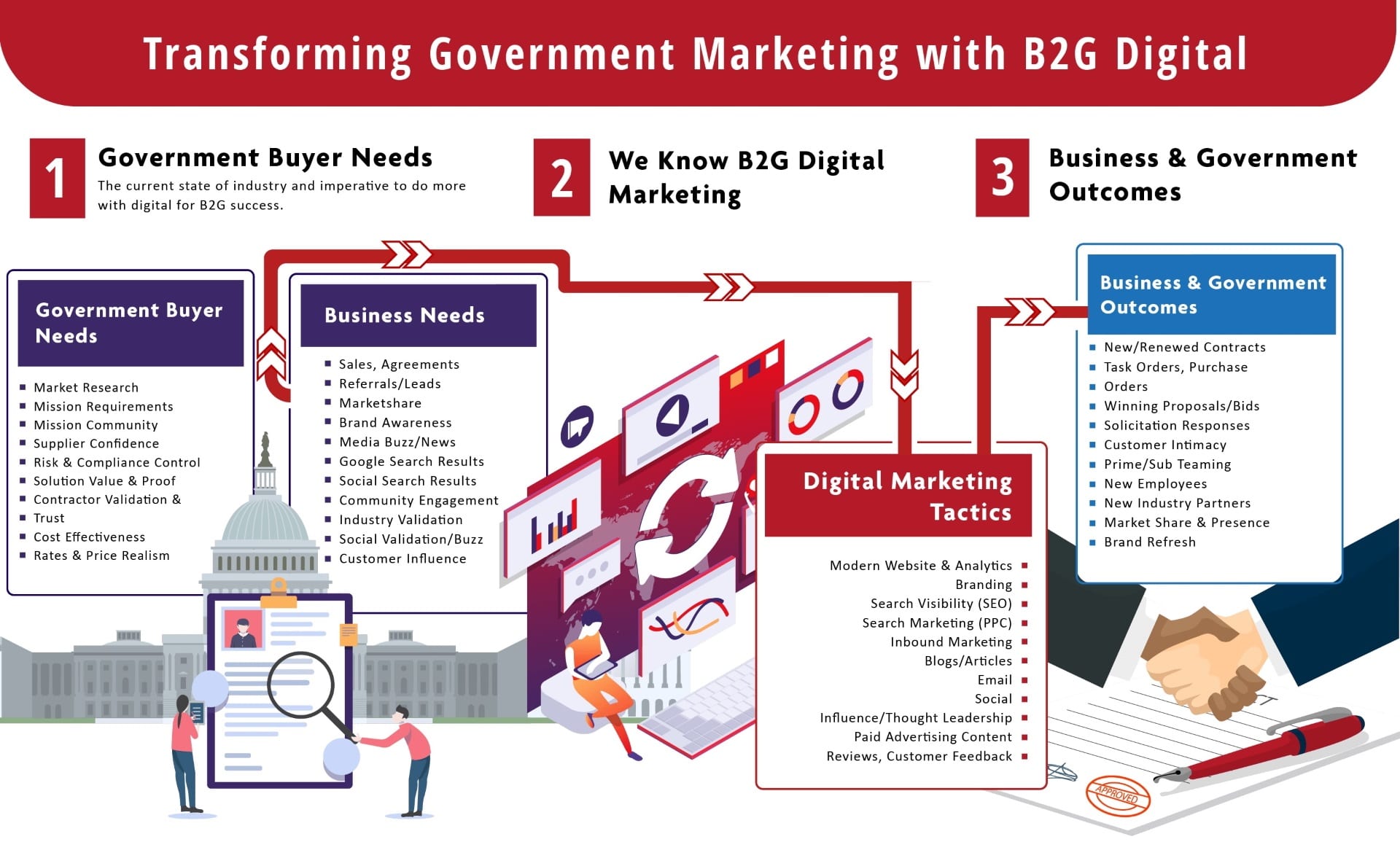Is digital marketing, in particular search engine optimization (SEO) and other inbound content marketing techniques, effective for business-to-government (B2G) enterprises? For businesses who seek exposure and wins on government contract opportunities, lead generation, and for landing a role on a larger team’s procurement bid?
KME offers B2G digital marketing for government suppliers and vendors seeking procurement visibility targeted at program/contract owners and bidding Primes/team members conducting acquisition market research.
Digital Sales and Marketing to Government Agencies
Selling to government agencies, particularly the Federal government, is usually a long-term relationship-building exercise. The entire DC-area B2G business development community understands this – it’s a long dance with many partners, always constrained by the FAR (Federal Acquisition Regulations – which seek to level the competitive playing field). Particularly if your product, services or expertise aren’t really unique, hard to get, or otherwise likely to be a directed or sole-sourced procurement. If they are, SEO is extremely important, as well as paid advertising (i.e. paid content placement, PPC, search ads, etc.).
So, for your “secure value-added information technology consulting services, best practices and industry-leading solutions for X government mission” – where does SEO fit in? How many different ways can you use these “keywords”, to be sure procurement officials, agency program managers and all the “influencers” in the acquisition context find you when they’re searching Google?
Best SEO & PPC Keywords for Government Contracting (B2G)
Focusing on phrases and words like this – “best practices”, “industry-leading X“, “X solutions” isn’t useful. It obviously needs to be said – to meet most RFP requirements and boilerplate – but the procurement team and their advisors don’t search for this. They don’t search for potential – they search for results, for proof of capability, and most importantly, trust signals. Basically, reasons to not exclude you, explicitly or tacitly, through procurement language. Also, they’re searching for validation that there is in fact a qualified, competitive community who can help them – and you must be part of that community.
What are the trust signals you should appear for, in search results, that demonstrate you should be part of the procurement? To the government, or to potential partners and even new talent?
Let’s start with social media – it’s pretty well established, now, that significant, useful and trusted activity across social media is a great way to bolster search results for the related topics. You must be a trusted influencer in the online communities that matter, in the explicit mission area and procurement requirement topic. Some communities matter a lot more than others, like Industry Discussion Groups, LinkedIn, Twitter and Govloop, vs. Facebook and Pinterest – yet, information shared across all channels ultimately adds up to a consistent social signal.
Leading trust signals in social media are expertise, certifications, publications, reviews, community leadership, focused activity and responsiveness. These will translate into more discussion, sharing and good feedback of your content and online reputation, which translates into better visibility for your website. Who are your experts, and are they sharing online?
Trust signals on your website include both dynamic, frequently-updated content (that reflects your social presence), and more static content that forms your core asset inventory. Your assets are what sets you apart. are what can be both quantitatively and qualitatively demonstrated for both website readers and search engines. Describe these with keyphrases, surrounded by supportive context (both visible text and imagery, and hidden metadata or digital content attributes):
- “X years experience on ABC contract” (with similar requirements or buyer)
- “successful delivery of X upgrade”
- “X implementations of ABC software” (supporting similar requirements)
- “expertise in X solution” (per RFP requirements, and with very visible, public expertise)
- “most popular/top 10 solution for X“
Click to Enlarge
Influencing Government Acquisition, Procurement and Market Research Online
You certainly can optimize your online content, using standard SEO methods – plus some “secret sauce” in the form of government BD & acquisition expertise – in a manner that will positively influence some element of the procurement lifecycle. The lifecycle includes work and research around early RFI and RFP creation, Analysis-of-Alternatives (AoA) reviews, Government Lifecycle Cost Estimates (GLCE), Industry Surveys, and the many other ways that Government procurement teams try to (A) determine how best to engage industry for their requirements, and (B) validate that industry CAN and SHOULD be engaged through open bidding.
It may become evident, after a lot of research, that the initial contracting and RFP scope – and perhaps the budget – simply isn’t right – and needs to be changed.
Changed, potentially, in a way that reflects what they found online regarding YOUR expertise, YOUR leadership in the space, YOUR alignment with other trusted stakeholders, YOUR documented and proven results with YOUR incredible talent and services.
In other words, you’ve actually influenced the RFP (or prepared to address it) in a way that makes your response much more likely to be on the short list, just what the government (or your Prime) really needed.
Contact us at KME for more information about B2G Digital Marketing & SEO – ask us about our experience successfully helping promote contractors vying for the “DHS Eagle II” contract as an example.
P.S. – look at your Government Consulting/Contracting website – is there a picture of the leadership, and/or the team that would actually be engaged with the government? And links to 3rd-party validation of their background, expertise? Add this, today.

